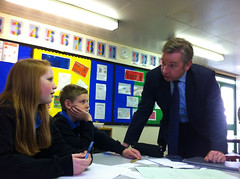The devil is in the detail, and the subject is not apolitical.
Read MoreQuestions, by Terry Freedman

Questions, by Terry Freedman
The devil is in the detail, and the subject is not apolitical.
Read MoreHere is the comment I made near the end of the online form. I decided to take the opportunity to speak my mind about the whole process of consultation, right from the beginning. Unfortunately, I referred to the Royal Society of Engineers by mistake rather than the Royal Academy of Engineering. It was a simple mistake which I hope won’t undermine the legitimacy of my statement.
I also took the opportunity to say what I think about the constant messages from ‘on high’ about ICT being ‘boring’. I think it undermines teachers, and from that point of view is unforgivable.
 This is not so much a review or even a summary of the recent Westminster Forum Conference called ‘Reviewing the new Computing Curriculum’ as a series of observations arising from it and related articles. The reason for that approach is that I’d like to make this article useful and interesting to as wide a range of people as possible, not only those concerned with the ICT or Computing Programme of Study in the National Curriculum in England and Wales.
This is not so much a review or even a summary of the recent Westminster Forum Conference called ‘Reviewing the new Computing Curriculum’ as a series of observations arising from it and related articles. The reason for that approach is that I’d like to make this article useful and interesting to as wide a range of people as possible, not only those concerned with the ICT or Computing Programme of Study in the National Curriculum in England and Wales. This article is a bit autobiographical, but there is an objective point to it. Actually, it’s completely autobiographical, but there is still a point to it.
This article is a bit autobiographical, but there is an objective point to it. Actually, it’s completely autobiographical, but there is still a point to it.
One day when I was 15, I was milling around in this youth club trying to look cool, when someone came up to me and asked me if I’d be interested in joining a cinematography club he wanted to get started. He explained to me that I’d learn how to use a cine camera to shoot films, edit the films,learning about lighting and all that other technical stuff, so I said “Yes!”.
I’d never touched a cine camera in my life.
 There has been much discussion about the curriculum in general in England recently, and the ICT curriculum in particular. I wrote about the latter a few months ago, in an article entitled 5 Characteristics of an Ideal Programme of Study for ICT. Now, three months and two draft versions of a new ICT Programme of Study later, I should like to put forward a few comments, both about the area of “ICT curriculum” in general, and about recent developments in the UK in particular.
There has been much discussion about the curriculum in general in England recently, and the ICT curriculum in particular. I wrote about the latter a few months ago, in an article entitled 5 Characteristics of an Ideal Programme of Study for ICT. Now, three months and two draft versions of a new ICT Programme of Study later, I should like to put forward a few comments, both about the area of “ICT curriculum” in general, and about recent developments in the UK in particular.
 It’s astonishing how everyone is an expert on school education these days. Everyone, that is, except the people who actually work in and with schools. The latest half-baked idea appeared in the BETT opening speech by Michael Gove, the Education Secretary for England & Wales. Here’s what he said:
It’s astonishing how everyone is an expert on school education these days. Everyone, that is, except the people who actually work in and with schools. The latest half-baked idea appeared in the BETT opening speech by Michael Gove, the Education Secretary for England & Wales. Here’s what he said:
Universities, businesses and others will have the opportunity to devise new courses and exams. In particular, we want to see universities and businesses create new high quality Computer Science GCSEs, and develop curricula encouraging schools to make use of the brilliant Computer Science content available on the web.
This is a dreadful idea for several reasons.
The number of responses to consultations tends to be low. For example, the Royal Society in England has received 125 responses to its consultation on computing in schools. Admittedly this is a niche area, but it still seems pretty low to me, given the fact that there are over 17,000 primary schools in England and, especially, over 3,000 secondary schools which, one would assume, have a vested interest. I believe that the number of responses to Government consultations is higher, but still relatively small.
I think people are mistaken not to have their say in this type of situation, even though I can understand why they might not wish to do so.
(c) Terry Freedman All Rights Reserved